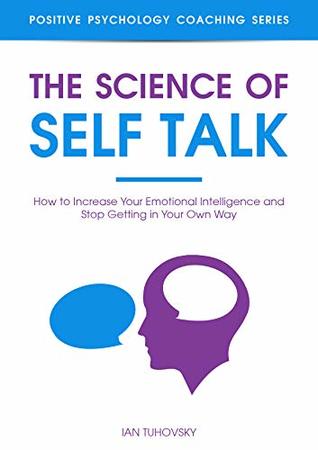More on this book
Community
Kindle Notes & Highlights
by
Ian Tuhovsky
Read between
November 8, 2022 - January 11, 2023
Self-talk isn’t random. It exhibits patterns that repeat themselves. And everyone has their own characteristic self-talk that is uniquely theirs.
Pulkit Velani liked this
Some people’s self-talk is mostly about the future, while others’ is an internal dialogue about the past. Some self-talk tends to be positive and upbeat, while other self-talk is harsh and critical. Or it can be defeatist, gloomy, and negative. Sometimes, self-talk is focused more on people; sometimes, it's fixated more on things. Sometimes, it’s mainly about others, and, sometimes, mainly about oneself.
self-talk creates a feedback loop.
through self-talk your ego makes a lot of judgments about you and your performance as you do the things you do.
constructive kind of self-talk would be any kind of self-talk that leads you in the right direction, toward your goals and toward becoming a better you.
Dysfunctional self-talk would be any self-talk that bogs you down in unproductive, stale, repetitive patterns, especially if those patterns
make you feel miserable and helpless.
people with clinical depression have a kind of compulsive destructive self-talk.[1]
Psychologists call it rumination, and its characteristic is repetitively going over symptoms of distress, like a scab you keep obsessively picking at. Its other characteristic is passivity. You don’t focus on solutions but problems.
Dysfunctional self-talk tells a story. It's the wrong kind of story, a story in which you’re passive and helpless.
You’ve made mistakes before; it’s not the end of the world. Now that you know more, you can use this information to get closer to what you really want.
We still relied on the same Paleolithic, hunter-gatherer cognitive toolkit for navigating life, but life less and less resembled the environment to which we were best fitted.
Negative self-talk increases that stress by distorting our perception of challenges and our ability to meet them. In other words, it makes routine difficulties look like threats. It makes things seem worse than they really are. Thus, it makes stress even more stressful.
first of all, “loser” is a value judgment, not a fact.
Value judgments are also useful for weighing your own habits, decisions, and actions and deciding whether or not they’re good for you and the people you care about, whether they’re ethical, and so on.
A loser is someone who, after making a mistake, doesn’t introspect, doesn’t exploit it, feels embarrassed and defensive rather than enriched with a new piece of information, and tries to explain why he made the mistake rather than moving on.
Get the facts right.
Know what you want. And figure out how to get from here to there.
learned helplessness.
Learned helplessness makes you neglect the things in your life that you need to change.
That’s because you’re constantly telling yourself that you can’t change and you can’t improve things. Negative self-talk is a symptom of learned helplessness. It’s the voice in your head that says I can’t and It’s no use.
Negative self-talk views stressors as a threat. Positive self-talk views stressors as a challenge.
You are, moment to moment, claiming your free agency and constantly giving birth to a new self.
But it’s no good either to take on monstrous challenges that overwhelm you because if the challenge is too big, let’s face it, you’ll probably fail.
When you’re facing challenges without pushing yourself too hard and also without being too soft on yourself, you’ll feel positive, interested, attentive, and engaged. You’ll have a sense that what you’re doing matters.
And if you fool yourself into thinking you’ve already achieved a goal, even though you haven’t, then you won’t try to achieve it, even though you should.
Realistic about themselves, 2. Specific about what they want and how to get it, and 3. Confident about their ability to achieve their goals.


